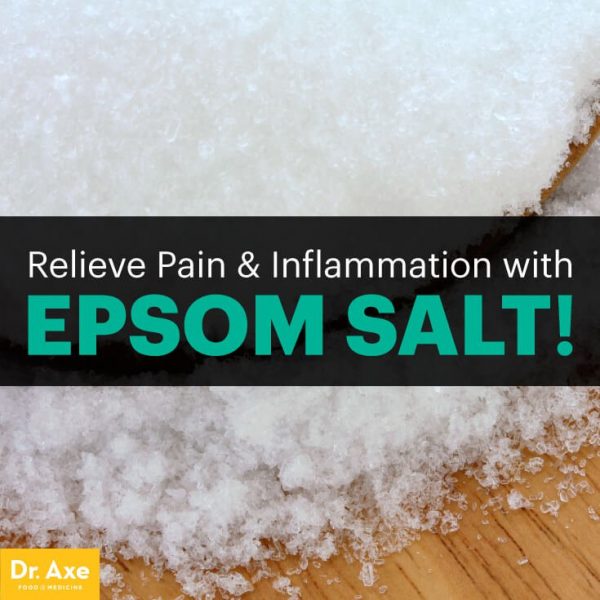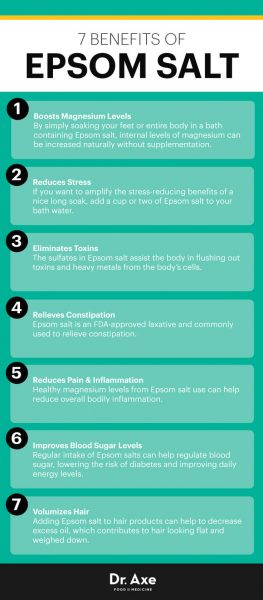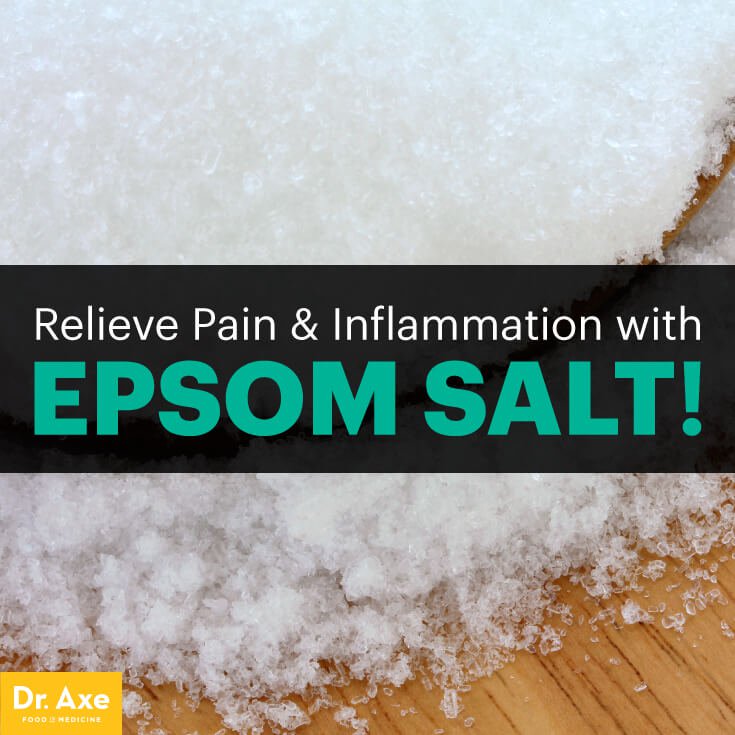 Athletes commonly use it for sore muscles while gardeners sprinkle it on plants to increase their growth. Epsom salt has a long history of diversified use and benefits for health, beauty, household cleaning and outdoor gardening. It was originally prepared from mineral water while today it’s obtained mainly from mining operations.
Athletes commonly use it for sore muscles while gardeners sprinkle it on plants to increase their growth. Epsom salt has a long history of diversified use and benefits for health, beauty, household cleaning and outdoor gardening. It was originally prepared from mineral water while today it’s obtained mainly from mining operations.
Epsom salt is a natural exfoliant and anti-inflammatory remedy that can be used to treat muscle aches and sore muscles, dry skin, and even to fight various internal health issues. Simply add Epsom salt to your next detox bath recipe or foot soak to create a luxurious and therapeutic at-home spa experience.
Epsom salt derives its name from a bitter saline spring located at Epsom in Surrey, England, where the compound was first distilled from water. It’s different from traditional salts in that it is actually a mineral compound of magnesium and sulfate.
The chemical formula for magnesium sulfate is MgSO4, which shows that Epsom salt can actually be broken down into magnesium, sulfur and oxygen. Epsom salt is composed of small, colorless crystals and does look similar to table salt — however, table salt is completely different from Epsom salt since it consists of sodium chloride.
 Epsom Salt Recipes
Epsom Salt Recipes
Bone & Joint Pain Relief
Soaking in a relaxing bath containing Epsom salt is a tried-and-true natural remedy for bone and joint pain. The Epsom salt can be added to the bath or used as a compress.
Heel Spur Aid
Since magnesium is key to bone health, Epsom salt can be a great natural remedy for a heel spur. A heel spur is caused by displacement of calcium on the bone that forms on the underside of the heel. Heel spurs can be mildly to extremely painful. One natural solution for healing a heel spur is to soak the foot in a warm bath with Epsom salt, which helps relieve the inflammation and pain associated with the heel spur.
Gallbladder Flush
The gallbladder is not as well-understood or talked about as our other organs, but an optimally functioning gallbladder is something we all should strive for when it comes to our health. Some of the warning signs that you may have a gallbladder problem include gallbladder pain, poor fat digestion, rosacea of skin and leaky gut syndrome. Epsom salt can be utilized in a gallbladder and liver flush recipe.
Detoxification & Healing
Epsom salt is a key ingredient in many detoxifying bath recipes. It can be used as a stand-alone salt for soaking, or it can be blended with dried botanicals and essential oils for a more decadent bathing experience.
Homemade Healing Bath Salts
Combining Epsom salt with baking soda and beneficial lavender oil makes for a simple, easy bath recipe to help you calm down, relieve tension on your muscles, and recover all-around both mentally and physically. Check out my full Homemade Healing Bath Salts recipe here.
Possible Side Effects of Epsom Salt Usage
Never use a higher dose of Epsom salt than what is recommended on the package label or as your doctor has directed. Magnesium sulfate taken orally can make it harder for your body to absorb other medications you take by mouth, especially antibiotics. Avoid taking other medicines within two hours before or after you take magnesium sulfate as a laxative. If you have rectal bleeding or if you do not have a bowel movement after using magnesium sulfate as a laxative, stop using the medication and call your doctor at once. These may be signs of a more serious condition.
Magnesium in any form, including Epsom salt, must be used with caution in patients with renal failure, since it is processed by the kidneys and can reach toxic levels easily in those patients. Magnesium sulfate is often used to successfully treat eclampsia and pre-eclampsia in pregnant women, but pregnant or nursing women should generally exercise caution and consult their doctors being using Epsom salt.
Common side effects of excessive intake of Epsom salt include mild gastrointestinal upset including nausea, abdominal cramping and/or diarrhea. Serious side effects of magnesium sulfate overdose include the following: allergic reaction (rash; hives; itching; breathing difficulties; chest tightness; or swelling of the mouth, face, lips or tongue), dizziness, flushing, faintness, irregular heartbeat, muscle paralysis or muscle weakness, severe drowsiness, or sweating. You should tell your doctor immediately if you experience any of these symptoms after using Epsom salt. Serious side effects of Epsom salt are rare when used in recommended dosages.
As always, if you have any questions or health concerns, check with a doctor before internal or external use of Epsom salt.
See full article here: DrAxe.com



